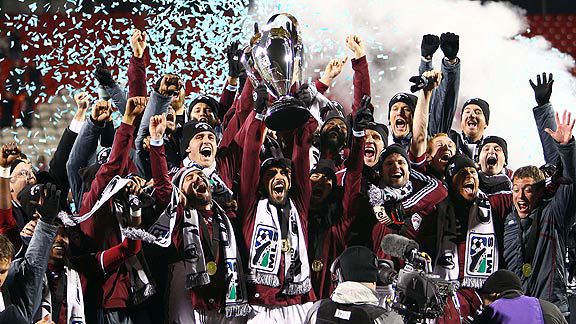 The growth of fantasy sports is changing the landscape for the professional sports fan – the game that is much loved (whether soccer, basketball, baseball, or something else) or followed can now have a different level of interaction and control for the fan. Choose players, select which ones play at a certain time, spend a certain allocation of money to develop a team, win prizes, win money – all of these possibilities are creating a new type of fan; a fanatical, fantastical fan.
The growth of fantasy sports is changing the landscape for the professional sports fan – the game that is much loved (whether soccer, basketball, baseball, or something else) or followed can now have a different level of interaction and control for the fan. Choose players, select which ones play at a certain time, spend a certain allocation of money to develop a team, win prizes, win money – all of these possibilities are creating a new type of fan; a fanatical, fantastical fan.

I observed this recently whilst over at a friends house – he had a game on the TV with two teams that I knew he didn’t follow or have any loyalty with. When I inquired about it he said, “Yes, but so and so is on my fantasy squad.” As the day wore on, multiple devices were tuned to different match ups featuring his “fantasy” team – iPads, iPhones, TV, and laptop computer each showing a different competition. And, of course, the app that tracked all of the fantasy measures was pulled up on each of them to give predictions and show valuable statistics for future decisions that needed to be made. Needless to say, the time spent at my friends house wasn’t quality – I felt like I had been sucked into his fantasy world and it didn’t make for good company.
 Now, as you read this, if you are in an age group of Generation X or higher, you might be thinking, “Fantasy sports, that’s ridiculous…” But a recent story highlighted just how much fantasy is changing the landscape, not just of the fan, but of the economy. For example, this USA Today story highlights the hopes and dreams of a growing number of the population to earn a wage at playing fantasy sports. It has long been thought that the money around fantasy sports was in the advertising audience that the games create as this CNN Money article in 2006 discusses, but people earning a wage? It doesn’t seem real.
Now, as you read this, if you are in an age group of Generation X or higher, you might be thinking, “Fantasy sports, that’s ridiculous…” But a recent story highlighted just how much fantasy is changing the landscape, not just of the fan, but of the economy. For example, this USA Today story highlights the hopes and dreams of a growing number of the population to earn a wage at playing fantasy sports. It has long been thought that the money around fantasy sports was in the advertising audience that the games create as this CNN Money article in 2006 discusses, but people earning a wage? It doesn’t seem real.
Fantasy sports is costly, though – not just in the way that it can occupy the mind of a person like my friend I mention above. Through the money exchanged in events like the NCAA March Madness Tournament and in the amount of employer hours lost in countries like America, as this article from The Atlantic mentions, there is question whether people are really fans of anything anymore or whether they are involved in something more subtle and more insidious – gambling. Is fantasy sports a gambling gateway?
I will admit that I have played and still play fantasy sport games (rarely for any money). I feel the tug myself – the temptation to put another game on the TV to “see how my guy is doing,” the temptation to get on one more website and read one more article or bit of advice, the lure of the free app that will let me make substitutions on the go – all of it could consume me and my time. And to combat some of these things I have put some boundaries around these kinds of games: 1. I must be in intentional community (i.e. no random fantasy sports play for the sake of it). 2. Little to no money exchange – maybe a $25 buy-in league would be my max as that is what it might cost to go see a movie with someone. 3. Time boundary – a few minutes to set a roster, switch something around, etc. Not spending hours upon hours researching and studying things. 4. Not letting it interfere with family time, work time, or ministry time. 5. Asking people to reflect back to me on whether it seems to be an interference or is taking a wrong level of priority (i.e. do they see ill effects)?
A biblical guideline for me is Philippians 4:8,
Finally, brothers and sisters, whatever is true, whatever is noble, whatever is right, whatever is pure, whatever is lovely, whatever is admirable–if anything is excellent or praiseworthy–think about such things.
When I sense that the fantasy game is starting to become anything other than these things, it’s time to shut it down, turn it off, cut it out of life. As a Christ-follower it is important to stay grounded in the reality of the world and not be distracted and tempted into creating my own reality which leads me away from what I ought to be focused on.
Blessings,
Rev. Brad Kenney











 A friend recently lost his job. Terminated without any warning, he expressed shock and dismay when the company that he had worked for over 8 years told him, “We’re going in a different direction.” Box in hand, he cleared out his desk and made his way home – bewildered and confused while coworkers looked on. Whilst we don’t often consider it in this way – a death had occurred. Relationships, pay, significance, identity, and much more all were “killed” in that particular moment for my friend and he had to cope with a great sense of loss that was compounded by the whole thing being confusing and unforeseen.
A friend recently lost his job. Terminated without any warning, he expressed shock and dismay when the company that he had worked for over 8 years told him, “We’re going in a different direction.” Box in hand, he cleared out his desk and made his way home – bewildered and confused while coworkers looked on. Whilst we don’t often consider it in this way – a death had occurred. Relationships, pay, significance, identity, and much more all were “killed” in that particular moment for my friend and he had to cope with a great sense of loss that was compounded by the whole thing being confusing and unforeseen. Losses like this are commonplace in life and also in professional sport – being traded or cut, a career-ending injury, or a personal trauma all represent a type of “death” that one can experience in the course of one’s professional career. In the midst of the dying process, as human beings, we search for redemptive and hope-filled moments – we await the next offer or opportunity, we hope for change or something different to come along.
Losses like this are commonplace in life and also in professional sport – being traded or cut, a career-ending injury, or a personal trauma all represent a type of “death” that one can experience in the course of one’s professional career. In the midst of the dying process, as human beings, we search for redemptive and hope-filled moments – we await the next offer or opportunity, we hope for change or something different to come along. When that new thing does come along it is almost like experiencing a “resurrection” of the soul. The sun shines clearer, we can see purpose in our situation, we are filled with a new found sense of hope. This Easter Sunday, as Christians, we reflect on the Ultimate Death and Life in Jesus Christ. The brutality of Friday’s crucifixion and the death – of Christ, and seemingly of so many others things (relationships, hopes and dreams) that occurred was heavy. Perhaps the heaviest time ever in the span of history, but Sunday was coming.
When that new thing does come along it is almost like experiencing a “resurrection” of the soul. The sun shines clearer, we can see purpose in our situation, we are filled with a new found sense of hope. This Easter Sunday, as Christians, we reflect on the Ultimate Death and Life in Jesus Christ. The brutality of Friday’s crucifixion and the death – of Christ, and seemingly of so many others things (relationships, hopes and dreams) that occurred was heavy. Perhaps the heaviest time ever in the span of history, but Sunday was coming. No matter where you are right now – whether approaching a seeming death, in the throes of pain and suffering, or just plain “dead” – you can have life again. Cry out to God – he has not abandoned you or I. He has the power to raise dead things to new life again. And he will do it – for you and for me.
No matter where you are right now – whether approaching a seeming death, in the throes of pain and suffering, or just plain “dead” – you can have life again. Cry out to God – he has not abandoned you or I. He has the power to raise dead things to new life again. And he will do it – for you and for me.




 First, making a distinction between superstition and rhythms can be helpful. There are some things that players, coaches, or teams out of superstition and there are other things that a team does in order to develop a rhythm or pattern. For example, warming up before a game with exercises and drills is more of a pattern than a superstition and a way of preparing the body for the task. In a similar way, an individual player may have their own pattern of preparing for a game – from taking a nap, to reading, to even praying. Sometimes, a rhythmic action can become superstitious (for example, a player who prays before a game having success and then determining that the prayer is what made him successful). This is an area where a chaplain must provide clarity and insight.
First, making a distinction between superstition and rhythms can be helpful. There are some things that players, coaches, or teams out of superstition and there are other things that a team does in order to develop a rhythm or pattern. For example, warming up before a game with exercises and drills is more of a pattern than a superstition and a way of preparing the body for the task. In a similar way, an individual player may have their own pattern of preparing for a game – from taking a nap, to reading, to even praying. Sometimes, a rhythmic action can become superstitious (for example, a player who prays before a game having success and then determining that the prayer is what made him successful). This is an area where a chaplain must provide clarity and insight.







 But regardless of the athlete and the environment of academics that they come from, one of the roles of the chaplain in professional sport is
But regardless of the athlete and the environment of academics that they come from, one of the roles of the chaplain in professional sport is  If helpful at a collegiate level, you can imagine how much more helpful at a professional level. I am coming to realize more and more, that some of my work as a chaplain is to help the young men that I work with to become more solid in life and not just in academics, but in life and faith. Part of my role is helping them in the process of going from boyhood to manhood. Helping them to become real men – men of integrity, men of faith, men of honor, men of valor – men that are not, paper thin.
If helpful at a collegiate level, you can imagine how much more helpful at a professional level. I am coming to realize more and more, that some of my work as a chaplain is to help the young men that I work with to become more solid in life and not just in academics, but in life and faith. Part of my role is helping them in the process of going from boyhood to manhood. Helping them to become real men – men of integrity, men of faith, men of honor, men of valor – men that are not, paper thin.





